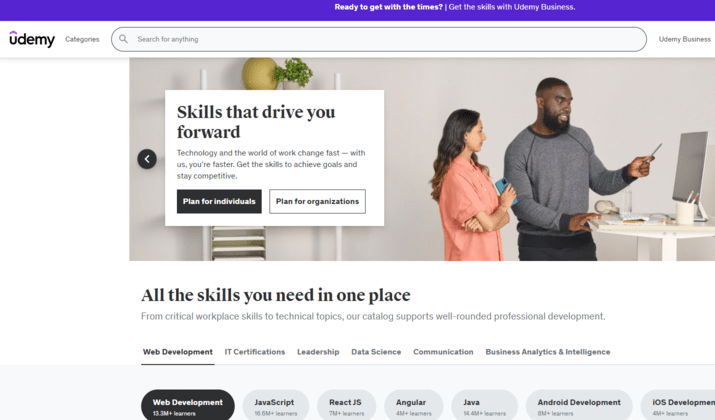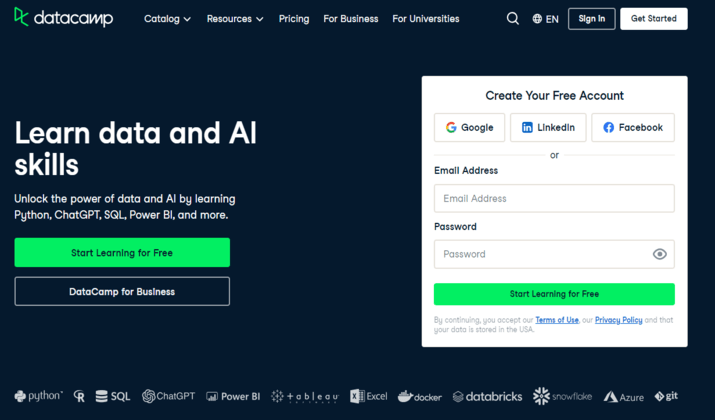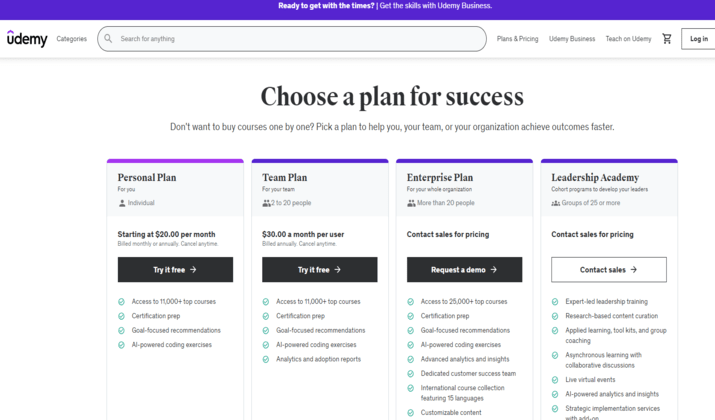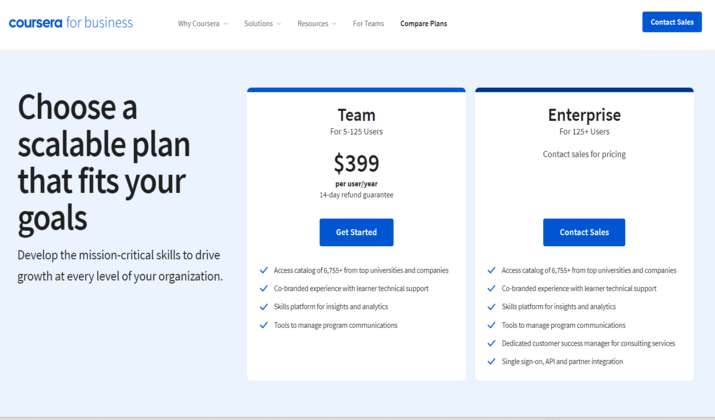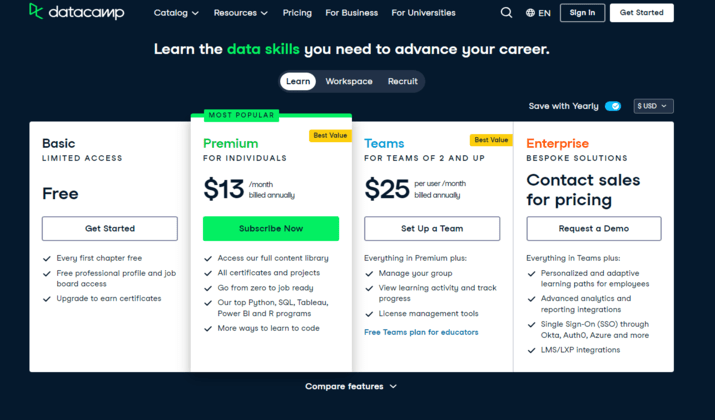If you’re looking to enhance your skills and knowledge, Udemy, Coursera, and DataCamp are three popular options to consider.
Get Started with DataCamp for FREE.The place to learn R, Python & Data Science. Check Special Pricing.
In this article, we will compare these platforms in terms of course offerings, pricing, certification options, and learning experience to help you make an informed decision about which platform is best suited for your needs.
Let’s begin.
Udemy vs Coursera vs DataCamp
Overview & Courses
Udemy, Coursera, and DataCamp offer a wide range of courses, including courses in data science, programming, and other technology-specific fields.
Here’s an overview of each platform:
Udemy
Udemy is known for its vast selection of courses across various subjects. Whether you’re interested in programming, marketing, graphic design, or personal development, Udemy has you covered.
Here are some quick facts:
- Udemy has a massive variety of courses, with more than 100,000 available.
- It supports 65 languages, which is more than both Coursera and DataCamp.
- There are 650 free courses available on Udemy.
- Udemy is known for its flexible learning timetables, allowing learners to fit education around their lives.
With such a wide range of courses, you’re sure to find something to suit your interests and goals.
Get Started with DataCamp for FREE.The place to learn R, Python & Data Science. Check Special Pricing.
Coursera
Coursera offers around 4,000 curated courses from top universities and organizations. These courses cover a diverse range of subjects, including but not limited to business, computer science, humanities, and health.
Here are more details:
- Coursera was built by two Stanford professors and collaborates with top universities to create courses.
- Coursera offers certification and degree programs.
- Some courses may require access to third-party software, which can be a disadvantage for those who cannot access these tools or prefer studying on their phones.
Coursera’s partnership with prestigious institutions ensures that you have access to high-quality educational content taught by experts in the field.
DataCamp
DataCamp, on the other hand, focuses specifically on data science.
If you’re looking to explore the world of data analysis, DataCamp is an excellent choice. They offer courses, practice exercises, and projects in Python, R, SQL, and machine learning.
Here’s more about DataCamp:
- DataCamp is career-focused and offers emerging courses taught by instructors with extensive experience in data science and analysis fields.
- It provides a native Jupyter Notebook for all video chapters and exercises, making it more convenient for learners.
- DataCamp offers numerous additional resources, such as cheat sheets, webinars, and case studies, to enhance the learning experience.
DataCamp’s specialized focus allows you to dive deep into the world of data science and gain valuable skills that are in high demand.
Get Started with DataCamp for FREE.The place to learn R, Python & Data Science. Check Special Pricing.
Summary
To sum up, Udemy offers a more extensive range of courses, lower pricing, and more languages supported, while DataCamp has a higher overall score and focuses on career-oriented courses with additional resources.
Coursera collaborates with top universities to create courses and offers certification and degree programs.
To have a better understanding of the course offerings on each platform, you can explore their websites and browse through the categories that interest you the most.
Remember that the breadth and depth of course offerings can greatly impact your learning experience and help you achieve your goals in the most effective way possible.
Also read: DataCamp or Udemy For Python – Which Is Right For You?
Pricing
Pricing for Udemy, Coursera, and DataCamp varies significantly based on the platform and the specific course or subscription chosen.
Udemy
Udemy is known for its affordable pricing, making it accessible to a wide range of learners. Many courses on Udemy are available for as low as $29, allowing you to learn without breaking the bank.
Udemy follows a pay-per-course model, with most courses priced between $29 and $200, although they often run promotions offering significant discounts.
Get Started with DataCamp for FREE.The place to learn R, Python & Data Science. Check Special Pricing.
Udemy also offers special pricing plans for those who do not want to buy courses one-by-one. Here are the details of these plans:
- The Personal Plan designed for individuals start at $20 per month and offers access to over 11,000 top courses.
- The Team Plan is intended for teams of 2-20 members and starts at $30 a month per user.
- The Enterprise Plan is designed for teams over 20 members and features customized pricing.
Coursera
Coursera offers a mix of free and paid courses. While some courses on Coursera are available for free, most of their paid courses range from $30 to $100.
The cost of each course may vary depending on the content and complexity. Here is a quick look into the pricing details:
- Free access: With this, you can access all free courses. However, prices for guided projects start at $9.99.
- Professional Certificates: You will have to pay between $39-$99 per month to access professional certificates.
- University Certificates: To receive university certificates, you are required to pay between $1000-$3000.
The subscription plans from Coursera are as follows:
- Team plan: The pricing starts from $399 per user annually and offers access to 5–125 users.
- Enterprise plan: If your team consists of 125+ users, you can opt for this plan that comes with customized pricing.
DataCamp
Operating on a monthly subscription model, DataCamp allows you to access their courses, practice exercises, and projects for a recurring fee.
DataCamp offers various pricing options for its courses as follows:
- Basic Plan – This free option is a smart way to check out the courses and features before signing up.
- Premium Plan – The Premium Plan costs $13 per month when billed annually, offering access to a full content library, certificates, and projects.
- Teams Plan – This plan includes unlimited access to 470+ courses, with a subscription fee of $25 per user per month when billed annually.
- Enterprise Plan – The Enterprise Plan features bespoke solutions for organizations at custom rates.
Remember that pricing is subject to change. For latest information on rates and discounts, check the pricing page of these platforms.
Check out: DataCamp vs Brilliant – Which Is Better?
Certification & Accreditation
Udemy
This platform offers certificates of completion for most courses. While these certificates are not accredited, they still serve as a valuable recognition of your efforts and commitment to learning.
They can be a great addition to your resume and demonstrate your dedication to expanding your skill set.
Coursera
Coursera is the clear winner when it comes to certifications and accreditation. Many of their courses are offered by top universities and organizations, providing learners with the opportunity to earn accredited certificates and even degrees.
With Coursera, you can showcase your accomplishments to potential employers and further enhance your professional profile.
DataCamp
DataCamp also offers certificates of completion for its courses. Similar to Udemy, these certificates are not accredited.
However, they are a testament to your completion and understanding of data science concepts, which can be advantageous when applying for relevant positions or showcasing your expertise.
Read this too: DataCamp vs LeetCode – Which Is Better?
Learning Experience
When it comes to the learning experience, each online learning platform offers its unique approach. The learning experience on Udemy, Coursera, and DataCamp varies based on the platform’s approach to course delivery:
Udemy
Udemy provides a self-paced learning experience, allowing you to learn at your convenience with on-demand courses.
You have the flexibility to start and complete a course at your own pace, making it ideal for individuals with busy schedules or those who prefer a more independent learning style.
Coursera
This platform, on the other hand, offers a versatile learning experience. In addition to on-demand courses, they also offer scheduled courses where you can learn alongside other students.
This creates a sense of community and provides an opportunity for collaborative learning and exchanging ideas.
DataCamp
The learning experience here is focused on interactive coding exercises. They prioritize a hands-on approach to learning, enabling you to practice and apply your skills in real-time.
With their emphasis on coding, DataCamp offers a highly immersive experience, allowing you to build practical expertise in data science and related fields.
Ease of Use
Whether you are a tech-savvy individual or a beginner, these platforms offer a seamless learning experience. Accessing and enrolling in courses is a breeze, allowing you to quickly get started on your learning journey.
In terms of ease of use, Udemy, Coursera, and DataCamp offer user-friendly interfaces, but there are some differences in their usability:
- Udemy: Known for its intuitive platform and easy navigation, Udemy provides a straightforward learning experience. The platform is designed to be user-friendly, allowing learners to easily browse courses, access materials, and track their progress.
- Coursera: Offers a well-organized platform with clear course structures and resources. Coursera’s interface is user-friendly, providing easy access to course materials, assignments, and discussions. The platform also offers features like peer grading and discussion forums to enhance the learning experience.
- DataCamp: Focuses on interactive coding exercises, which may require a bit more hands-on engagement compared to the more traditional course formats of Udemy and Coursera. While DataCamp’s platform is designed for practical skill development in data science, it may have a steeper learning curve for beginners due to its emphasis on coding exercises.
Overall, Udemy, Coursera, and DataCamp all offer user-friendly platforms, but the ease of use may vary depending on the individual’s familiarity with online learning, coding exercises, and personal preferences for course formats.
Additionally, all three platforms, Udemy, Coursera, and DataCamp, are accessible on both desktop and mobile devices.
This means that you can access your courses anytime, anywhere, providing you with the flexibility to learn at your own pace and convenience.
You might find this useful: Datacamp vs Udacity – Which Is Better?
Conclusion
When it comes to choosing the best online learning platform, Udemy, Coursera, and DataCamp all offer unique advantages.
Udemy stands out for its vast course selection at affordable prices, making it a great option for learners on a budget.
Coursera, on the other hand, provides accredited certificates, which can be beneficial for those seeking academic recognition.
If you’re specifically interested in data science, DataCamp’s focus on this field and interactive learning experience make it a top choice.
Ultimately, it’s important to consider your specific needs and preferences. Think about the type of courses you’re looking for, your budget, and the learning experience you desire.
By taking these factors into account, you can make an informed decision and choose the online learning platform that best suits you.


